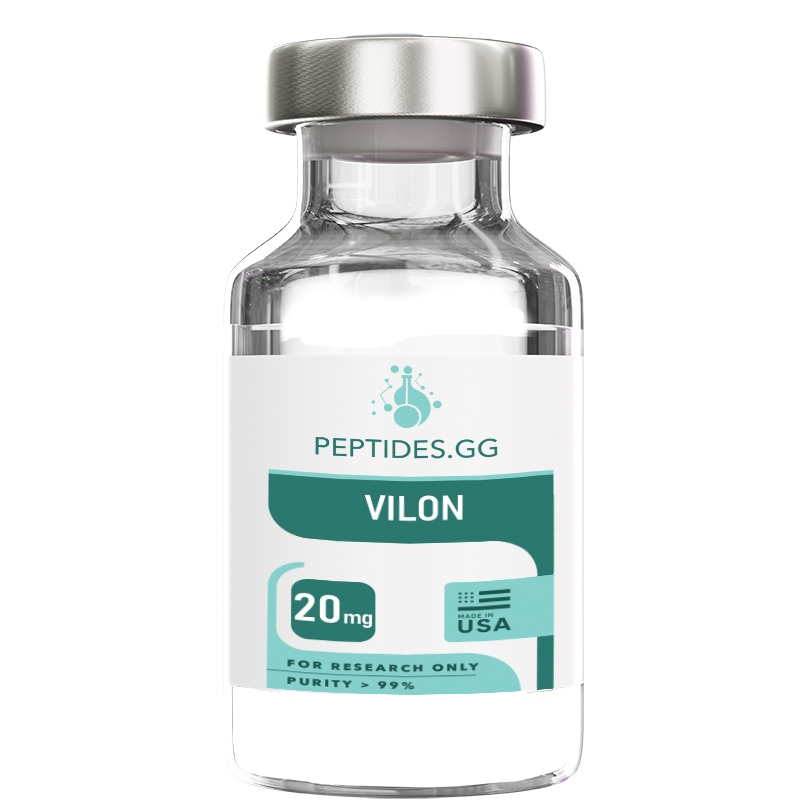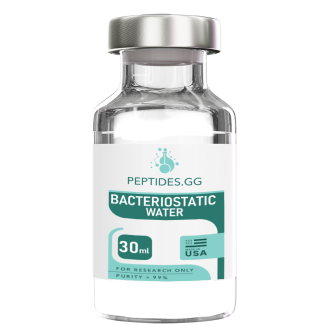Buy Vilon (Bioregulator) peptide for research applications. High-purity Vilon (Bioregulator) research peptide available for laboratory studies and scientific investigation. Shop premium quality research-grade peptides manufactured in the USA with comprehensive Certificate of Analysis documentation.
Important: All products are intended as research chemicals only for laboratory and in vitro testing and experimentation. All product information is educational and not to be taken as medical advice. No products are for human or animal use.
Vilon (Bioregulator)
$60.00
- Free Delivery on all orders over $200
- Earn 5% Store Credit with Every Order
- Same Day Shipping Before 1 PM PST
- 10% Discount for Cryptocurrency Payments
14-day money-back guarantee
If you are not satisfied with the product, simply return it and we will refund your money

Buy Vilon (Bioregulator) peptide for research applications. High-purity Vilon (Bioregulator) research peptide available for laboratory studies and scientific investigation. Shop premium quality research-grade peptides manufactured in the USA with comprehensive Certificate of Analysis documentation.
Important: All products are intended as research chemicals only for laboratory and in vitro testing and experimentation. All product information is educational and not to be taken as medical advice. No products are for human or animal use.
Research Overview
Vilon serves as a research tool for investigating thymus-specific bioregulation and immune organ tissue function in laboratory settings. This peptide bioregulator belongs to the class of organ-specific peptide preparations originally developed through research on tissue-specific regulatory mechanisms.
Vilon research applications extend across multiple areas of thymic biology including T-cell development, positive and negative selection, thymic epithelial cell function, thymic involution with aging, and immune system regulation. Laboratory protocols examine these effects in cell culture systems, thymic organ cultures, and preclinical animal models.
Molecular Characteristics
Complex Composition:
- Classification: Organ-specific bioregulator peptide complex
- Source Material: Bovine thymic tissue (pharmaceutical grade)
- Molecular Weight Range: 1,000-10,000 Da (heterogeneous peptide mixture)
- Peptide Content: Multiple short-chain peptides (typically 2-20 amino acids)
- Form: White to off-white lyophilized powder
- Solubility: Water, phosphate buffered saline, cell culture media
Research Applications
Thymic Epithelial Cell Research
Vilon serves as a research tool for investigating thymic stroma:
- Cortical TEC Function: Investigation of cortical thymic epithelial cells supporting early T-cell development
- Medullary TEC Research: Studies on medullary epithelial cells and negative selection
- MHC Expression: Examination of Class I and Class II MHC molecule expression for T-cell education
- AIRE Expression: Research on autoimmune regulator and tissue-specific antigen presentation
- Thymic Hormone Production: Investigation of thymulin, thymosin, thymopoietin secretion
Laboratory protocols employ thymic epithelial cell cultures (primary TECs, TEC lines) and thymic stromal cell characterization.
T-Cell Development Research
Research applications extend to thymocyte differentiation:
- DN to DP Transition: Investigation of double-negative to double-positive T-cell development
- Positive Selection: Research on TCR-MHC interaction and selection of functional T cells
- Negative Selection: Studies on deletion of self-reactive T cells and central tolerance
- CD4/CD8 Lineage Choice: Examination of single-positive T-cell differentiation
- Regulatory T-Cell Development: Investigation of Foxp3+ Treg generation in thymus
Experimental approaches include thymic organ cultures, reaggregate thymic organ cultures (RTOC), and thymocyte subset analysis.
Immune System Maturation Research
Laboratory studies investigate Vilon in immune development:
- T-Cell Repertoire Formation: Research on TCR diversity generation and selection
- Thymic Output Assessment: Studies on recent thymic emigrant production and peripheral seeding
- Tregs (TRECs) Analysis: Investigation of T-cell receptor excision circles as thymic function marker
- Naive T-Cell Production: Examination of thymic contribution to peripheral T-cell pool
- Central Tolerance Establishment: Research on self-tolerance induction mechanisms
Research protocols include TCR sequencing, TREC quantification, and thymic function assessment.
Thymic Aging and Involution Research
Vilon serves as a tool for investigating age-related thymic changes:
- Thymic Involution: Examination of age-related thymic atrophy and tissue replacement with fat
- TEC Senescence: Studies on thymic epithelial cell aging and reduced regenerative capacity
- Reduced Thymic Output: Investigation of declining naive T-cell production with age
- Immunosenescence: Research on age-related immune system decline linked to thymic function
- Thymic Rejuvenation: Investigation of potential thymic regeneration mechanisms
Research protocols employ aging models, thymic tissue analysis, and comparative studies across age groups.
Immune Regulation Research
Laboratory studies examine Vilon in immune system regulation:
- T-Cell Subset Balance: Investigation of helper, cytotoxic, and regulatory T-cell proportions
- Cytokine Production: Research on thymic cytokine environment (IL-7, IL-15, SCF)
- Chemokine Signaling: Examination of CCR7, CCR9, CXCR4 in thymocyte migration
- Notch Signaling: Studies on Notch pathway in T-cell lineage commitment
- Growth Factor Effects: Investigation of growth factors affecting thymopoiesis
Experimental models include immune cell phenotyping, cytokine profiling, and signaling pathway analysis.
Thymic Recovery Research
Vilon research applications include immune reconstitution:
- Post-Ablation Recovery: Investigation of thymic regeneration after radiation or chemotherapy
- Infection Recovery: Research on thymic function restoration after viral infections
- Stress-Induced Atrophy: Studies on thymic recovery from stress hormone exposure
- Transplantation Research: Examination of thymic contribution to immune reconstitution post-transplant
- Injury Models: Investigation of thymic repair mechanisms and regenerative capacity
Research approaches include injury-recovery models, stem cell studies, and thymic regeneration protocols.
Laboratory Handling and Storage Protocols
Lyophilized Powder Storage:
- Store at 2-8°C (refrigerated) in original sealed vial
- Protect from light and moisture
- Stable for 24 months refrigerated as unopened vial
Reconstitution Guidelines:
- Reconstitute with sterile water or appropriate buffer
- Add 1-2mL solvent per 10mg powder
- Gentle swirling motion recommended
- Final pH 6.5-7.5 for cell culture
Reconstituted Solution Storage:
- Short-term: 2-8°C for up to 7 days
- Long-term: -20°C in aliquots
- Avoid repeated freeze-thaw cycles
- Sterile filtration (0.22μm) for cell culture
Quality Assurance and Analytical Testing
Peptide Profile Analysis:
- HPLC peptide content verification
- Molecular weight distribution analysis
- Amino acid composition
- Peptide content determination
Purity Testing:
- Protein purity assay
- Endotoxin: <10 EU/mg
- Sterility testing
- Water content: <8%
Source Material:
- Pharmaceutical-grade bovine thymic tissue
- TSE/BSE compliance
- Standardized extraction protocols
Research Considerations
Experimental Design:
1. Concentration: 0.1-10 μg/mL in cell culture
2. Duration: 24-72 hours for gene expression; longer for differentiation studies
3. Cell Type Specificity: Verify thymic tissue selectivity
4. Culture Systems: Thymic organ cultures vs. stromal/thymocyte co-cultures
5. Complex Mixture: Account for multiple potential active components
Control Groups:
- Vehicle control
- Non-specific peptide control
- Positive controls (IL-7, stem cell factor)
- Tissue-specific comparisons
Mechanism Investigation:
- Notch signaling pathway regulation
- IL-7 receptor signaling
- Transcription factor modulation (FOXN1, AIRE)
- MHC molecule expression regulation
- Thymic hormone production pathways
Compliance and Safety Information
Regulatory Status:
For in-vitro research and preclinical studies only. Not approved for human therapeutic use, dietary supplementation, or medical applications.
Intended Use:
- In-vitro cell culture research
- Thymic tissue explant studies
- In-vivo preclinical research
- Academic and institutional research
NOT Intended For:
- Human consumption
- Therapeutic treatment
- Dietary supplementation
- Veterinary applications without oversight
- Medical/clinical applications
—
 25% OFF $400+ • 35% OFF $800+ ALL WEEKEND
25% OFF $400+ • 35% OFF $800+ ALL WEEKEND 


